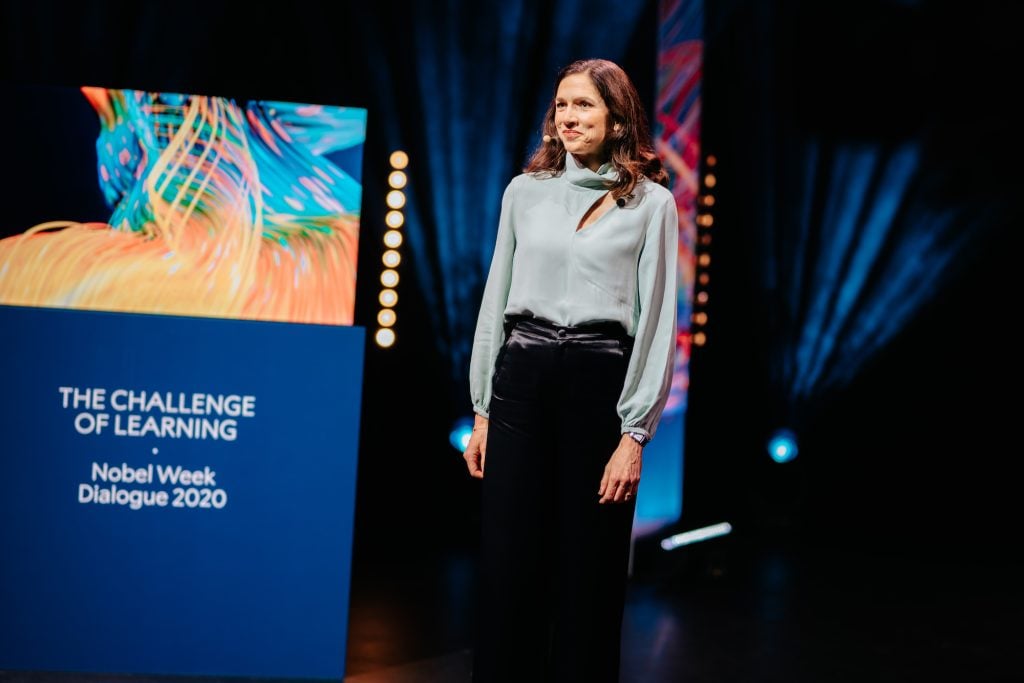The Nobel Prize Dialogue has been inspired by the Nobel Week Dialogue, which has been taking place in Sweden since 2012 on the day preceding the Nobel Prize award ceremony. Laura Sprechmann, Nobel Prize Outreach CEO, on Nobel Week Dialogue in Stockholm held on 9 Decemeber 2020. © Nobel Prize Outreach. Photo: Clément Morin
Nobel Prize Outreach and the University of Pretoria (UP) are pleased to announce that UP will host the first Nobel Prize Dialogue to be held in Africa, on 18 and 19 May 2021. Nobel Laureates from across the world will participate in the meeting, with ‘The Future of Work’ as its theme. Topics that will be discussed include, among others, the working skills people will need in future, and what can be done to create hope for a younger generation, given technological change.
The Nobel Prize Dialogue has been inspired by the Nobel Week Dialogue, which has been taking place in Sweden since 2012 on the day preceding the Nobel Prize award ceremony. Since then it has been organised in many countries across the world, but this will be the first time it takes place on the African continent. The conference will be open to the public and entry will be free of charge.
“This is the first time we will host an event in South Africa and we look forward to intense discussions, not least with young people,” says Laura Sprechmann, Nobel Prize Outreach CEO. “We all see the urgency in having an informed dialogue, with the participation of Nobel Laureates and other experts from science and other parts of society, about how working life may evolve in the coming years.”
The Nobel Prize Dialogue aims to bring science and society closer and stimulate creative thinking by gathering a unique constellation of Nobel Laureates, key opinion leaders, policy makers, students, researchers and the general public. Many questions will be raised during the dialogue, such as: What is the ‘new normal’ for working life? What benefits does diversity bring to the workplace? How does an ageing global population change the labour market? And how is in the COVID-19 pandemic changing the nature of work?
“We are extremely excited about the prospect of hosting the first-ever Nobel Prize Dialogue in South Africa at the University of Pretoria,” says Professor Tawana Kupe, Vice-Chancellor and Principal of the University of Pretoria. “We look forward to welcoming Nobel Laureates and other speakers to our campus to discuss the very important and relevant topic of ‘The Future of Work’. I believe that given the current situation with the uncertainty brought about by the COVID-19 pandemic, the theme will provide for robust and thought-provoking discussions. The dialogues will be a great opportunity to re-imagine the future of work.”
More information about the dialogue will be made available as soon as the programme has been finalised. While it is still uncertain whether UP will be able to host an in-person event in light of COVID-19 restrictions, Nobel Prize Outreach and the University are working on plans to host a virtual or hybrid event, should it be required.
www.nobelprize.org/future-of-work
The event will be organized with the kind support from Nobel International Partners 3M, ABB, Ericsson and Scania.
About the University of Pretoria
The University of Pretoria (UP) is one of the largest contact and residential universities in South Africa, with its administration offices located on the Hatfield Campus, Pretoria. This 112-year-old institution is also the largest producer of research in South Africa.
Spread over seven campuses, it has nine faculties and a business school, the Gordon Institute of Business Science (GIBS). It is the only university in the country that has a Faculty of Veterinary Science which is ranked top in Africa, and overall has 120 academic departments, as well as 92 centres and institutes, accommodating more than 55 000 students and offering about 1 100 study programmes.
UP is one of the top five universities in South Africa, according to the 2019-2020 rankings by the Center for World University Rankings. It is also ranked among the top 100 universities worldwide in three fields of study (veterinary science, theology and law), and among the top 1% in eight fields of study (agricultural sciences, clinical medicine, engineering, environment/ecology, immunology, microbiology, plant and animal sciences and social sciences).
In June 2019, the annual UK Financial Times Executive Education Rankings once again ranked GIBS as the top South African and African business school. The University also has an extensive community engagement programme with approximately 33 000 students involved in community upliftment. Furthermore, UP is building considerable capacities and strengths for the Fourth Industrial Revolution by preparing students for the world beyond university and offering work-readiness and entrepreneurship training to its students.
As one of South Africa’s research-intensive universities, UP launched the Future Africa Campus in March 2019 as a hub for inter- and transdisciplinary research networks within UP and the global research community to maximise 4IR innovation and address the challenges and stresses our continent and world is facing. In addition UP also launched the Javett Art Centre in September 2019 as a driver of transdisciplinary research development between the Humanities and other faculties. In 2020 UP will launch Engineering 4.0. as a hub not only for Smart Cities and Transport, but also to link the vast resources in technology and data sciences to other faculties via Future Africa. These initiatives are stimulating new thinking at the frontier of ‘science for transformation’.
For more information, go to www.up.ac.za
